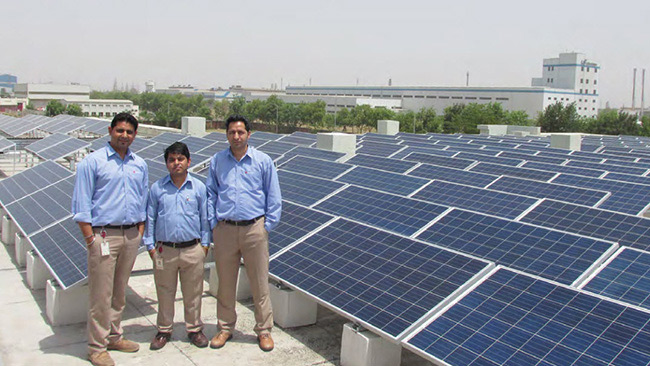Going Green in India
- 11/14/2017
- Corporate

India has emerged as a world leader in promoting renewable energy development and tackling global climate change. Over the past decade in particular, the Ministry of New and Renewable Energy (MNRE) in New Delhi has developed ambitious goals for increasing access to clean energy sources. And through sustainable energy initiatives, the government of India has increased its efforts dramatically to develop and deploy new and renewable energy throughout the country.
With regard to solar power specifically, the Government of India has raised its target levels for solar power generation five-fold since 2010. Under the original plan in 2010, the goal was to achieve solar power capacity of 20 gigawatts by 2022 throughout India. The government’s revised solar power goal is now 100 gigawatts by 2022. (Estimates are that 100 gigawatts of solar energy can provide power to 7,250,000 homes.)
In the state of Haryana, where the Hollister Incorporated plant is located, the state government requires that a minimum of 3% total energy usage must come from solar power. Hollister is working proactively to exceed that requirement substantially and is already one of the top three users – and producers – of solar power in Bawal.
Last year (2016), the Hollister Bawal plant initiated a ‘Go-Green’ solar project initiative, which is expected to provide 15% of the plant’s total energy requirements through an array of solar panels installed on the plant’s rooftop.
How Solar Cells Work
Solar cells are composed of two layers of semiconductor material with opposite charges: positive [p-type] and negative [n-type]. Sunlight hitting the surface of a solar cell causes electrons to move from one layer of semiconductor material to the other – thus creating a circuit and providing a flow of electrical current.
Solar Panel Installation
The Bawal engineering team installed the rooftop solar panels – ahead of schedule – in early 2017. Team members responsible for the installation included Madhu Lakharwal, Bali Ram, and Vikas Sharma. “We anticipate that this solar initiative will not only reduce the plant’s overall carbon dioxide emissions,” says team member Vikas Sharma, “but that there will also be substantial cost savings in our future energy usage.”
From the beginning – a focus on the environment
The solar power initiative at the Bawal plant is just the most recent ‘green’ initiative at the plant. Even in the initial design phase – before construction of the plant began – the focus was on environmental impact and cost savings.
Green Building: From its inception, the Bawal plant was designed and constructed to be energy efficient. The building is fitted with angled and tinted glass windows to reflect sunlight and dissipate heat from the sun. The exterior west-facing wall of the building is double-thickness insulated brick. The roof is not only insulated, but also includes UV resistant waterproofing.
Rainwater Harvesting: The Bawal plant was constructed with a rainwater harvesting system to collect, store, distribute rainwater, and manage water levels underground.
Wastewater Recycling: The plant’s wastewater is recycled through an on-site sewage treatment plant. The recycled water is used in gardening and landscaping at the plant.
Additional Water Conservation: Low-flow water fixtures, together with toilets and urinals with hydronic sensors, reduce water consumption by more than 50%.
Building Lighting: The entire plant is fitted with LED lighting, which consumes one-third the electricity of conventional lightbulbs.
Eco-friendly Captive Power: The Bawal plant was designed from the outset with ‘captive power’ diesel generators to ensure uninterrupted power at the plant even if there is a local power failure. The diesel generators are eco-friendly and silent, and meet all local environmental regulations.
Bawal Solar Project Overview
- Rooftop solar panels generate 330 kilowatts of power (15% of plant’s energy usage)
- Excess solar power – beyond the needs of the plant – will be sold back to the state of Haryana and made available on the country’s power grid
- Annual cost savings of almost $100,000
